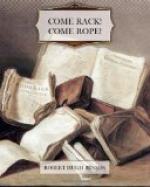“He is at Norbury, you say, sir?”
“Yes; but he goes here and there continually. He has been to London to lay informations, I have no doubt, for I know that he hath been seen there in Topcliffe’s company.... It seems that we are to be in the thick of the conflict. We have had above a dozen priests in this county alone arraigned for treason, and the most of them executed.”
His voice had gone lower, and trembled once or twice as he talked. It was plain that he could not bear to speak much more against the son that had turned against him and his Faith, for the sake of his own liberty and the estates he had hoped to have. Robin made haste to turn the talk.
“And my father, sir?”
Mr. John looked at him tenderly.
“You must ask Mistress Marjorie of him,” he said. “I have not seen him these three years.”
Robin turned to the girl.
“I have had no more news of him since what I wrote to you,” she said quietly. “After I had spoken with him, and he had given me the warning, he held himself aloof.”
“Hath he been at any of the trials at Derby?”
She bowed her head.
“He was at the trial of Mr. Garlick,” she said; “last year; and was one of those who spoke for his banishment.”
* * * * *
And then, on a sudden, Mistress Alice moved in her corner, where she sat with the widow of her brother.
“And what of her Grace?” she said. “Is it true what Dick told us before supper, that Parliament hath sentenced her?”
Robin shook his head.
“I hear so much gossip,” he said, “in the taverns, that I believe nothing. I had not heard that. Tell me what it was.”
He was in a torment of mind as to what he should say of his own adventure at Chartley. On the one side it was plain that no rumour of the tale must get abroad or he would never be able to come to her again; on the other side, no word had come from Mr. Bourgoign, though two months had passed. He knew, indeed, what all the world knew by now, that a trial had been held by over forty lords in Fotheringay Castle, whither the Queen had been moved at the end of September, and that reports had been sent of it to London. But for the rest he knew no more than the others. Tales ran about the country on every side. One man would say that he had it from London direct that Parliament had sentenced her; another that the Queen of England had given her consent too; a third, that Parliament had not dared to touch the matter at all; a fourth, that Elizabeth had pardoned her. But, for Robin, his hesitation largely lay in his knowledge that it was on the Babington plot that all would turn, and that this would have been the chief charge against her; and here, but a yard away from him, in the gloom of the chimney-breast sat Anthony’s wife and sister. How could he say that this was so, and yet that he believed her wholly innocent of a crime which he detested? He had dreaded this talk the instant that he had seen them in the hall and heard their names.




